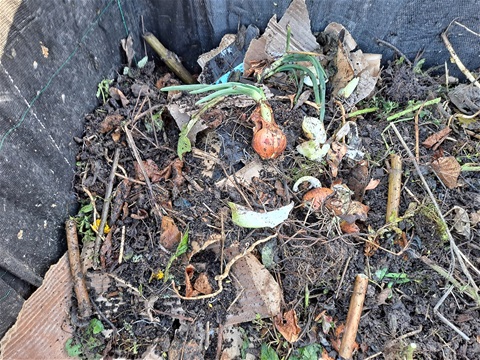Composting Onions
This morning I found half a dozen onions in our communal composting reception bin. Which has resulted in the following contribution.
There is advice out there that the onion family and citrus fruits should not be added to the wormery. It is said that they may increase the acidity of the decomposing materials and as high acidity levels will kill the worms it is better not to add them to small domestic wormeries. However, many composters do add onions, shallots, leeks, and garlic to their wormeries either cooked or in small amounts and find that feeding these materials in moderation does not cause problems.
I use two 5 litre caddies to collect kitchen waste , one for uncooked kitchen waste, for the wormeries, and a second for onion, garlic, citrus, and cooked food which is composted. The onion and garlic are put into this second caddy which is taken to the “cooked food” compost bin or is added directly to a Bokashi bin.to avoid odours in the house. Onion and cooked waste added to the compost bin is buried, again to reduce odours, which might attract vermin.
I have relatively small domestic wormeries but many of those with larger scale wormeries who add onion is small amounts have not reported problems although the worms may be slow to eat the dry outer layer of onion peel
Whole onions added to the bin (as in the photo) may grow new shoots but if chopped into small pieces when adding to the bin this should not be a problem. I often to use a layer of shredded paper immediately above the layer containing the chopped onions or onion peel as I once read that this helps absorbs the smell ( and I tend to have lots available). Mouldy onions from the kitchen can be composted but it is best not to compost diseased onions from the garden unless you are sure you bin will reached and stay in the thermophilic temperature range.

Latest comments
Do you have any data on ' application ' of Aerated Vermi Compost Tea to Mangoes and benneficial outcomes .
Very informative site. Having been away for 5 weeks and returning to evidence of rats under and around the compost bin, I can testify to lack of human activity allowing the rats to get comfortable.
can i use dog manure in compost and mulching leaves?
What is the C and N ratio for coffee chaff?